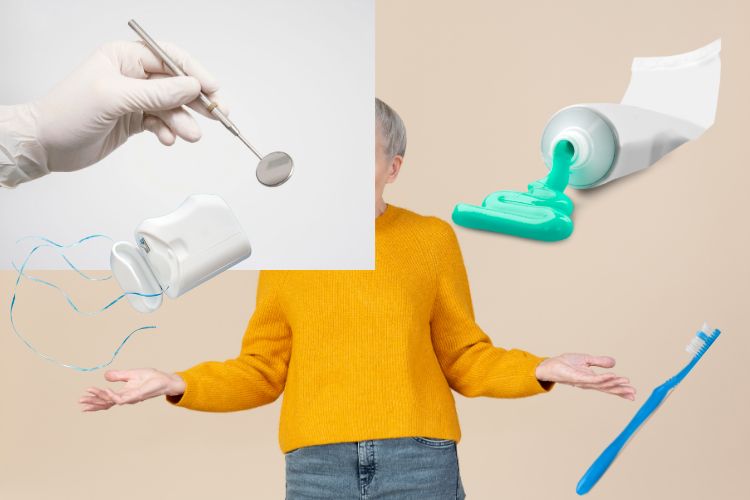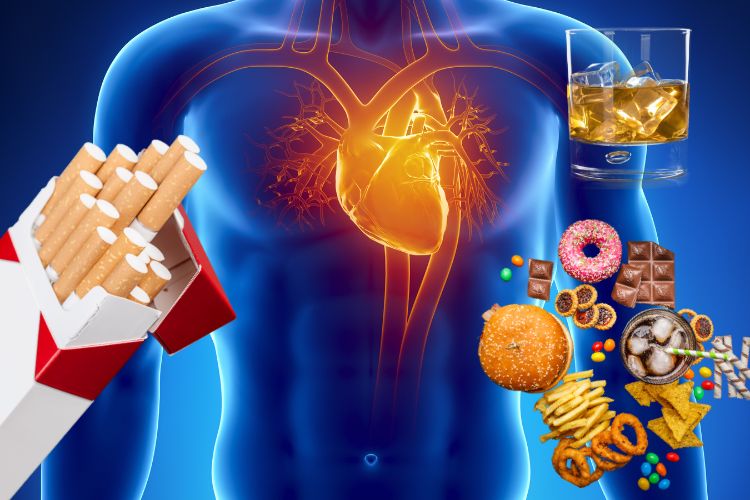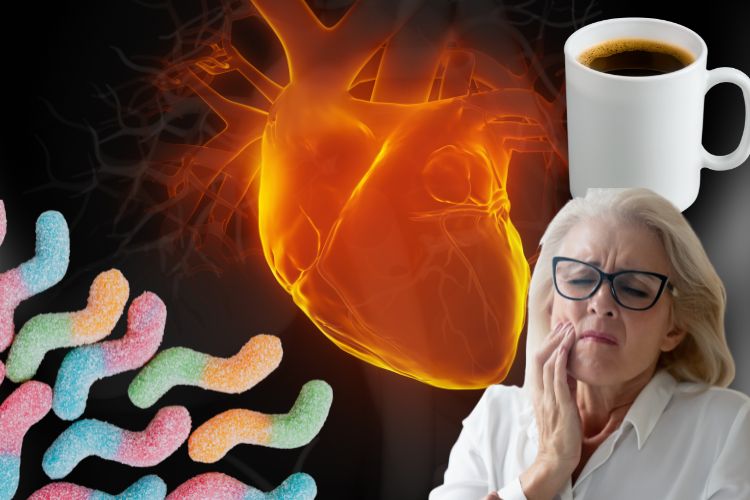While you might think of your teeth as those pearly whites that make up your beautiful smile, they’re more than just a pretty part of your face. The condition of your teeth and gums is directly linked to the health of other systems in your body. As we age, we may experience unique challenges to our dental health. We might also have other health problems that can be made worse if our dental health isn’t in top shape. Whether you know that your dental health is at risk or you want to maintain the great dental health you already have, it’s always good to stay aware of the dangers of poor dental health.
In this article, we’ll discuss important topics such as whether your dental health has an impact on the rest of your health, ways to maintain good senior dental health, and the dangers of poor dental health. Overall, our goal is to raise awareness of the dental health risks for seniors.
The Link Between Aging and Dental Health
From the time we’re babies teething, our gums and teeth change as we grow older. By the time we’re in our golden years, our oral health may start to develop problems that we didn’t have to worry about when we were younger. Part of this has to do with lifestyle choices, but it’s also partially due to natural changes that occur in oral health as we age. When you know about these changes, you’ll find it easier to properly prepare for them and prevent the oral health issues that come with them.
For older adults, some common dental conditions may include dry mouth (also known as “xerostomia”), caries in the root and coronal part of the teeth, and periodontitis. Older adults might also find that they experience an extra layer of sensitivity to drugs that dentists frequently employ such as local anesthetics and analgesics. Of course, you don’t necessarily have to be older to experience these issues. You might have a history of these dental issues that extends back to decades before you reached your older adult years. Still, if you’re getting older, it may be time to ask the dentist if he or she notices any of these issues in your teeth and gums.

While brushing your teeth, flossing, and other dental care activities might seem like they’re so elementary that they’re not even worth explaining, the truth is that dental hygiene matters that much more for seniors than it does for younger adults. If you want to prevent severe dental problems in your old age, it all starts with maintaining a strong dental hygiene routine.
Brushing your teeth in small circles with an appropriate toothbrush at least twice a day, flossing between meals, and using mouthwash as directed are just a few ways to practice good oral hygiene. In your younger years, you might have been able to get away with skipping out on oral hygiene every once in a while. Now that you’re older, every step you take to preserve your dental health will pay off. If that means setting a reminder on an electronic device or having a family member remind you to practice good oral hygiene, so be it. Your dental health matters and you should do whatever it takes to get in the habit of taking the best possible care of your teeth. Regular professional cleanings can also go a long way in preserving your teeth and gums while maintaining their overall health.
Dangers of Poor Dental Health in Seniors
Although you might think that dental health is just important because you want to preserve your beautiful smile, it goes deeper than the surface. Poor dental health affects more than your smile or self-esteem–it also affects your well-being and overall health. There are plenty of dangers and risks to poor dental health. We’ll dive into them deeper below.
Risk #1: Increased susceptibility to gum disease
For seniors, gum disease can be more prevalent than it is in the general population. Some seniors might notice that they’re experiencing receding gums. While the gums can recede at any age, this happens more often in seniors and those over 50 years of age. Receding gums cause many problems including loose teeth, losing teeth, and exposed root tissue. This opens the door to decay and infection. Gum disease affects more than the gums. It can also affect the ligaments and bones, as well as the tissue surrounding the gums. Overall, it’s best to ask your dentist if they notice any signs of gum disease and what they suggest as a plan of action to limit the effects of this disease.
When left untreated, gum disease can result in losing teeth and even having a hard time fitting dentures and other dental prosthetics. What’s more, it can lead to inflammation. This can cause pain and affect the ability of seniors suffering from gum disease to eat a proper diet.
Risk #2: Tooth decay and cavities
While some tooth decay and cavities are caused by factors outside of our control, poor oral hygiene certainly impacts the extent of tooth decay. When you don’t practice proper oral hygiene, you open the door to a build-up of plaque and bacteria in your mouth. This bacteria can cause cavities and other signs of tooth decay. Although cavities might not seem like a big deal, they can have huge consequences on the health of seniors as a whole. They can create pain that makes it hard for seniors to meet their nutritional needs through diet. They can also lead to infections, which can spread to other systems in the body such as the heart.
Risk #3: Oral infections and abscesses
When you neglect dental health, you may lead to an increase in bacteria in the mouth. This can cause decay and ultimately create infections. For seniors, oral infections are particularly dangerous. They can lead to inflammation that threatens the health of the heart and other parts of the body.
Risk #4: Nutritional deficiencies
As we know, oral health and proper nutrition are directly linked. Seniors who maintain good oral health can keep many or most of their teeth. This allows them to enjoy a more varied diet. For seniors who have lost all of their teeth or most of their teeth due to poor oral health, it can be tough to eat fresh vegetables and fruits. This can lead to poor dietary choices and create nutritional deficiencies. These deficiencies lead to further health problems.

Risk #5: Cardiovascular complications
Perhaps the most serious side effect of poor dental health in seniors is the cardiovascular complications that come with it. As health.harvard.edu explains, the same bacteria that are responsible for infecting gums and creating gingivitis and periodontitis can also move to blood vessels in other places in the body. When this happens, patients may experience small blood clots, which could lead to heart attacks and strokes. It can also lead to inflammation, which leads to heart disease, as well.
Risk #6: Impact on overall well-being and quality of life
For seniors who experience dental problems, there might be some psychological and social effects. For example, they may become depressed because of the loss of teeth or pain in their mouth. They might also have a hard time socializing because they might not be able to go out to dinner and enjoy the foods they once did or smile as often as they used to. Dental problems can cause seniors financial stress, as well. As dental bills increase, they may find themselves financially strained and their quality of life may go down. What’s more, their ability to eat a variety of nutritious foods can go down and decrease their quality of life as a result.
If you want a better quality of life as a senior, take care of your oral health. Your teeth will thank you for it. So will the rest of your body, including your cardiovascular system. You’ll be able to smile and laugh as often as you’d like without feeling self-conscious about poor dental health. You’ll also be able to rest easy knowing that you don’t have mounting dentist bills.
Prevention and Maintenance of Dental Health in Seniors
For good dental health, the best idea is regular dental check-ups. These are important because they allow you to catch dental and gum problems early. They also allow you to ask questions about how you might better care for your teeth. At home, you can also brush your teeth regularly, floss, and use dental health aids as directed. Eat a balanced diet to maintain good oral health and health overall.
Conclusion
Poor dental health is dangerous not only for teeth but also the cardiovascular system and other body parts. Take care of your teeth so they can take care of you for years to come. Proper dental hygiene matters, so don’t wait to start visiting your dentist regularly and practicing good oral hygiene at home.

